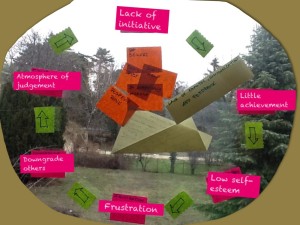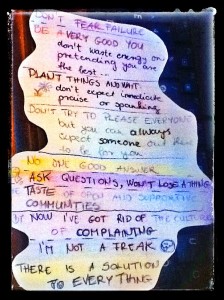
Before I Have Goals, I Dream
–Malu Sciamarelli
As another year begins, our thoughts turn to making resolutions, establishing new or returning to our old goals — either personal (this year I will get more sleep, exercise more, have a healthier diet) or professional (I will work fewer hours, participate more in workshops and conferences, take up another course.)
All worthy goals, but why do we permanently return to resolutions and goals that seem based on the idea of fixing all the things we were doing wrong? We have the feeling we want to right all the annoying wrongs of our lives, but are not fully aware of why. Is the objective of our resolutions and goals to be merely a corrective action or do we really know where we are going and where we want to be? If we do not know our true desires for our professional lives for the year ahead, then we cannot know the goals we must set and more importantly why we really need them.
In running, for example, you have a weekly training plan dependent on your target races – your desires. You have to know these desires so you can establish your training and goals. If you want to participate in a 10-kilometer race, you will need to train three times a week for four months. However, if you then want to master the half marathon, you will need to extend your training time and the distance covered during the week and — instead of four months — train for six months and follow a specific diet.
If you desire an advanced certificate in teaching so that you can be eligible to join a faculty, then build your training plan of classes, practice tests and study hard. If your desire is to present at an international conference this year, then submit your ideas to all the local conferences and workshops, gain exposure and experience as a presenter because this could be your training plan and diet to follow. Dream your desires then plan the training and diet that you need to follow to attain your goals.
So, instead of trying to correct all the wrongs or wanting to do everything you did not do last year, why not take some time to figure out what your professional goals really are? This is exactly the period when I take my time to dream! While goals are about should, dreams are about hope. It is only when we dream that we can hope to do something truly new, that will overtake old habits, old customs, old ways of thinking and just surviving. The plan that is made turned on its head then revised again can lead to greater success. Also by dreaming, we can have a vision of who we are and who we want to become. The more we know who we are, the less likely we are to procrastinate, and the closer we will come to accomplishing our goals.
If you have already started the year establishing some goals, they may give you some clues as to what your deeper dreams are. And when we take a moment to look at the why of a goal, we may find the true desire that fuels it.
Ask me what I am doing at this moment and the answer will be simple: dreaming! Dreaming of:
· Reading books, journal articles, and blog posts
· Writing articles, blog posts and materials
· My lessons, planning, peer observation
· Attending conferences, seminars, workshops, webinars, and teacher
development sessions.
· Giving a conference talk or delivering a teacher development session;
· My PLN (personal learning network) and their role in my professional life
· Communities of teachers, – how I am contributing and what I am learning
· Collaborative professional development
· Professional development courses — in-person and online.
After some days or a few weeks, I will be reflecting on my dreams, selecting the true ones and then the goals required to make them come true will become evident. And rather than procrastinating, or worse, forgetting my goals this year I may actually see them through: by dreaming, reflecting, identifying my goals, establishing the plans and training to accomplish them and finally making them come true.
What better time is there to determine our deepest desires for dreams and plant the seeds in the upheaval and renewal of our lives than at the beginning of this year?
Always be on the lookout for ways to nurture your dreams. Water them with optimism and solutions and you will cultivate success. — Lao Tzu
Connect with our iTDi Associates, Mentors, and Faculty by joining the iTDi Community. Sign Up For A Free iTDi Account to create your profile and get immediate access to our social forums and trial lessons from our English For Teachers and Teacher Development courses.

















